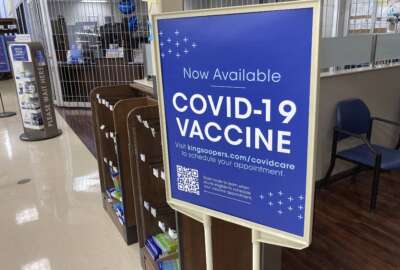Federal contractor vaccine mandate continues to vex contractors
With weeks to go before an ostensible deadline, contractors are still vexed by the nuances of the White House mandate.
Best listening experience is on Chrome, Firefox or Safari. Subscribe to Federal Drive’s daily audio interviews on Apple Podcasts or PodcastOne.
Sometimes the simplest things to say are the most complicated to do: Fly to the moon and back, establish world peace or require everyone in your company to get vaccinated if you want to do business with the federal government. With weeks to go before an ostensible deadline, contractors are still vexed by the nuances of the White House mandate. For some insight for coping, Morris, Manning & Martin partner Kelly Kroll spoke to the Federal Drive with Tom Temin.
Interview transcript:
Tom Temin: Kelly, good to have you back.
Kelly Kroll: Thanks for having me.
Tom Temin: And what are contractors saying at this late date? I mean, the deadline for federal employees has already come and gone.
Kelly Kroll: Right, it’s very much still trying to get their arms around this and how to implement it. Some of my clients got on the ball right away, as early as October before the FAR clause even made it into their contracts and started playing. Other ones called me yesterday, “What do I do? I just realized this applies to me.” Since Sept. 29, I’ve probably talked to at least two to three clients every day about this. And what to do is they have case by case situations that come up.
Tom Temin: I think a lot of contractors are perplexed by the fact that for those employees that will be on site at a federal agency, fine, I can understand that one. But if they will never be on site, why should you care, Mr. and Ms. Government? But I think what OMB is saying is that side of the workforce, contractors are just like every other company, part of the great effort to get the nation vaccinated. So they’ve kind of got you’re coming and going.
Kelly Kroll: Right, I don’t think the federal government’s trying to implement this from a safety perspective with respect to the agencies or anything that is just part of their entire policy for the United States as a whole. And this is one way, obviously, to reach a bigger number of people, right? We went from, “Hey, we’ll give you $100 if you get vaccinated” or free, whatever – sweatshirt, I don’t know what they were given out – to now, you might get terminated. So now we’ve gone the whole spectrum of “rewards,” as we should say, I’m sorry, I’m doing air quotes, but rewards if you want to call that for getting vaccinated, so …
Tom Temin: Right, because federal employees, I think, get a half day of paid leave if they want to do that. But that’s not something I think contractors can necessarily all afford to do.
Kelly Kroll: No, no, absolutely. I do have some clients that are giving people time to do that. But not everybody. It really runs the gamut of what I’m seeing how they’re implementing it and what they’re doing. And I in fact, have one client who has told me, obviously not going to name names, that they’re not going to sign the contract that they’re gonna let their government contract work go because it’s not that important to them, because they feel that they can’t get a fair share of their workforce on board with this. So they don’t want to be out of compliance. So they’ll just back out.
Tom Temin: Yeah. But for those that really do depend on federal work, and for a lot of companies locally, a big part of their business, in some cases, all of their business. What should they do with refuseniks, people that just simply say, sorry, I’m not going to do it?
Kelly Kroll: So you’re not talking obviously, about medical or religious accommodations you’re talking about the – I call them the “I-don’t-wanna guy,” right, that doesn’t have a valid exemption. So what I’m telling people right now, because this is evolving, and because this is changing all the time, and new FAQs are released every day by the Safer Workforce Task Force, or whatever the name of it is, these new FAQs come out. And so what the FAQ say right now, they say, “It’s up to you, contractor,” they say up to termination, but they do kind of imply that you need to provide counseling. So we’re talking to these people on a case by case basis, having them come in – I’m recommending to have them come into HR, talk to HR, talk to them about what their real concerns are, why they can’t do this, assist in getting information to them if they need that, and then just kind of take it day by day until we get up till Jan. 18, right? So we have some time here. So I’m not telling anybody to fire anybody on Christmas Eve. That’s what I’m doing right now.
Tom Temin: Do it on New Year’s Eve.
Kelly Kroll: New Year’s Eve.
Tom Temin: We’re speaking with Kelly Kroll, she’s a partner and government contract attorney at Morris, Manning & Martin. And what about the religious and medical exemptions? Is there merging, some standardized way of handling those?
Kelly Kroll: Sure. So we’re asking – and I’m working with our employment group at Morris Manning. And we’re putting together forms, they’re not complex, they’re kind of advising the employee of what the policy is, with respect to medical saying, “Hey, you got to get a doctor’s note, provide a reason, it’s got to be a certified doctor,” letting them know that the fact that you already had COVID is not a reason to not get the vaccine. With respect to the religious, I’m telling people not to dive too deep into that, right? Because your religious belief isn’t the same as someone else’s religious beliefs. So we’re just having them fill out a form. Some people want to go get notes from their spiritual leader, or whoever the equivalent of that is. I don’t know that that really helps. I mean, I could say I subscribe to the religions of Tom Temin and have you signed me a note. So I don’t know how much a note does in that case, but I think as long as you know, I mean, most of these people know their employees. And if they know that their employees aren’t just making something up, then they can just kind of accept that at face value really?
Tom Temin: Right. If they say, well, the chicken entrails pointed to no vaccine, then perhaps that may not work too well.
Kelly Kroll: And if they’re doing with a smirk, I mean, that’s kind of the way that you – and they know who those people are.
Tom Temin: And what do your clients say, with respect to their views of how this might be the first of a, I guess, regular issuance of whatever mandates the government thinks should be on the workforce?
Kelly Kroll: Well, that’s it. Well, because in my course, I said, the guidelines are in state of flux. What the FAR clause says is, when a guidelines change, you’re gonna do whatever the guidelines say. So I get a lot of deer in the headlights when I go, well, we could be like three months from now – now, you got to make everybody get boosters, right? And they’re like, “Oh?” They haven’t even thought about that, right. So it’s changing all the time. But I think your question is more around just something else, right? Like, they decided we all should wear purple raincoats. We haven’t really discussed that, to be honest with you. They are used to changing, there’s been a lot of changes in regulations with the cybersecurity requirements that they’ve had to deal with and changes in Buy America. And there’s just been a lot of changes over the last few years that most federal contractors roll with it because most of my clients do well, like you said earlier, a fair share their revenue is dependent on the government. So they’re just – until it gets too crazy they keep, I always see them just kind of getting on board. So maybe we’re all gonna wear purple raincoats?
Tom Temin: Right. And you said something quickly, but I think it’s an important point. And that is that the FAR directs companies to follow guidelines, even if there’s not formal rulemaking behind those guidelines. So you don’t have to stand on your kind of religious adherence to the FAR and say, “Well, it’s not on the FAR, I don’t have to do it.” Guidelines are referred to by the FAR as something you have to follow.
Kelly Kroll: Right. And that is unique, right? Usually it’s in the regulations. And sometimes they’ll point to a different manual like cybersecurity, like, the NIST standard is something that can change from time to time. But this is a daily thing, right? This new FAQs came out yesterday I think. One of my associates sent me a link who’s like, hey, there’s new ones. I haven’t even had a chance to look at them yet. So it’s evolving all the time. But the reason for it is a public national health issue.
Tom Temin: And to your knowledge, from your clients standpoint, are they hearing from contracting officers who are I guess the point people on this mandate? Are you hearing that your clients are hearing from contracting officers saying, “Are your folks vaccinated yet?”
Kelly Kroll: No. So they’re getting the clause and saying, sign the contract, and that’s all they want. They’re not saying, “Okay, now that you signed the modification to incorporate this in your contract” they’re not auditing it. They’re not asking about it. I was on a GSA webinar a couple of weeks ago with some higher ups from GSA, where they specifically said they had told their contracting officers – it was pertaining to the GSA Schedule program – that they had told their COs unless there’s some kind of red flag, this is not your job and responsibility to watch over this. Just make sure they sign like the mod and let’s go.
Tom Temin: They’ve got enough trouble monitoring labor costs.
Kelly Kroll: Right, it’s like it would be like, can you imagine so? No, it’s – this is not something that contracting officers – I haven’t heard of anybody. I’m sure there’s some contracting officer that personally cares and wants to make sure, but as a whole? No.
Tom Temin: All right, Kelly Kroll is a partner and government contract attorney at Morris, Manning & Martin. As always, thanks so much for joining me.
Kelly Kroll: Absolutely, my pleasure.
Copyright © 2024 Federal News Network. All rights reserved. This website is not intended for users located within the European Economic Area.
Tom Temin is host of the Federal Drive and has been providing insight on federal technology and management issues for more than 30 years.
Follow @tteminWFED






